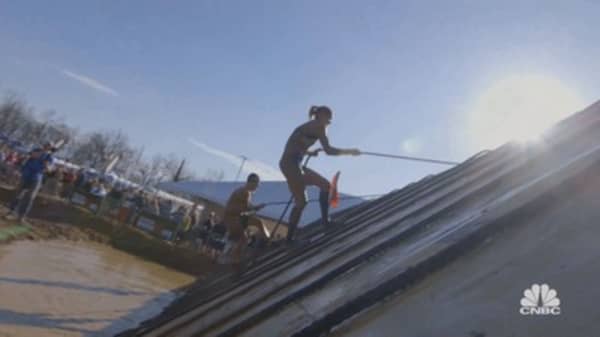I'm a corporate attorney by day; obstacle racer and endurance athlete by night (or, super early mornings). Most people would consider running through the mud and corporate life to be polar opposites. And perhaps I've compartmentalized my life into diametrically-opposed segments, but I find lessons I've learned in one to translate well into success in the other.
1. Break the tasks into manageable chunks.
When you are facing a 24-hour race, or a 100-mile ultramarathon, the first hour or few miles can be daunting. You check your watch — "I still have 23.5 hours to go?" In racing long distances, people often defeat themselves by looking at the entirety of the race and getting overwhelmed in the moment, causing racers to quit prematurely.
Read MoreLeBron James vs. Stephen Curry: Who wins for marketers?
My hack? Break up the race into small parts — "I'm going to make it to this next aid station" or "one more mile." Similarly, when faced with an overwhelming project at work, it's easy to get lost in the grand scheme. Break it up. Check off small parts as you finish.
2. Strong and well-rounded people are more useful.
A successful obstacle racer needs the trifecta of athletic skills — speed, strength, and skill. A single-faceted athlete, like a professional runner, may have one part of the equation, but won’t succeed in obstacle racing unless trained in all aspects — a true, well-rounded athlete. Professionally successful people mirror this — you can have book smarts to spare, but without social grace or emotional intelligence, you are hampering your abilities to succeed in the corporate world.
3. Those who adapt will succeed.
Despite your best preparation, the best-laid plans will go awry. A slip off an obstacle, a leg cramp, or a missed spear throw will cost you precious times (and sometimes victories or podiums). What you do when those inevitable failures happen determine your success. Do you throw in the towel and admit defeat? Or, do you kick it up and try and overcome that setback?
Read MoreWho earns more: FIFA staff or Wall Street traders?
Professional setbacks happen just the same — what do you do when a deal dies? Or, when a court rules against you? It's in those moments of small failures where a true path to success can be forged.
4. Compete against yourself, not against others
We invariably measure ourselves against others. It's competition — it's how we are ranked, ordered, and judged — whether that be against co-workers or fellow racers. In the workplace, it's how a pecking order is determined, and in athletics, that's how "elites" are vetted. But that external competition is enough to drive a person to obsession, and can lead to negative self-talk and lack of confidence.
Read MoreDial-a-Dolphin: NFL pro moonlights as Uber driver
So, I go into every race, into every work day, with a goal to compete against myself. A goal to have a clean race, or to serve the client to the best of my abilities. It's the internal fire — the innate need to constantly better myself, that drives my will to succeed. So if others outrace me, or outperform me at work — it's not because I gave it a feeble, half-hearted attempt. Compete against yourself, and never beat yourself.
5. Our greatest limiting factor is our minds.
It's human nature to limit yourself prematurely, without ever trying. It's easy – it's the path of least resistance to never even be in the running. I never expected that I could rise to the top of a sport while working as a full-time attorney at a large law firm. But I've found that the body is capable of pretty incredible things if you let your mind believe. It's not a perfect fit – there are sacrifices that come with needing to train at 4 am and then put in a full day at the office, and then train in the evenings. But it's part of the challenge. Would it be easier to be a full-time professional athlete? Sure. But I've never been one to take the easy way.
Commentary by Amelia Boone, the 2013 Spartan Race World Champion and two-time World's Toughest Mudder winner. By day, she is a bankruptcy attorney in Chicago. Follow her on Twitter @ameliaboone.
From flying off a mountaintop in a wingsuit to nailing a triple back motorcycle flip or kiteboarding 40 feet in the air, extreme sports are starting to catch some serious air. Tune in Thursday, June 18 at 10pm ET/PT to see Amelia Boone and other elite athletes test their limits in the CNBC documentary, "The New High: Extreme Sports."



